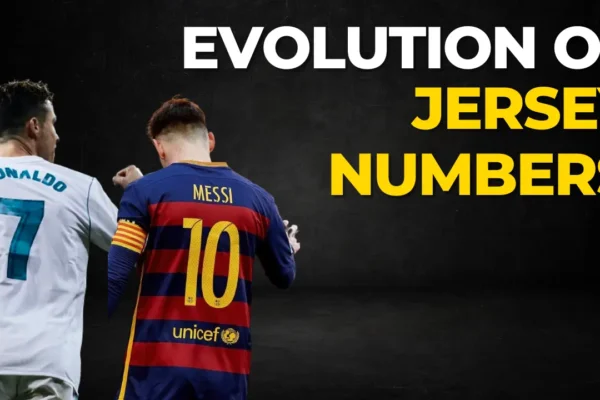
“The Green and Maroon Legacy: Mohun Bagan’s historic IFA Shield win”
In the archives of Indian sports history, certain victories transcend the boundaries of the playing field and become emblematic of a nation’s spirit and aspirations.
One such meaningful event unfolded in 1911 when Mohun Bagan, defied the odds to clinch the IFA Shield, transforming from colonial rivals to national heroes. Let’s delve into the details of this remarkable journey that unfolded more than a century ago
Mohun Bagan’s historic IFA Shield win of 1911.
On 29th July 1911 Mohun Bagan created history by becoming the first Indian team to win the prestigious IFA Shield, but before getting to this let’s first look at the history of the competition and the context leading up to this match.
History of IFA Shield:
Indian Football Association was founded in 1893 but all its founding members were British. They also started a tournament named the Indian Football Association Shield i.e. IFA Shield. IFA Shield is the third oldest football tournament in India.
All the teams participating in this tournament were British teams and only 1 Indian team got a chance to participate on an invitational basis. But in the late 1880s, the Nationalist Movement in Bengal was at its peak and nationalist sentiments were visible among the people against British rule thus we saw a lot of local teams coming up in football and one of them was Mohun Bagan.
History of Mohun Bagan

On 15 August 1889, the three big families of Bengal, The Mitra Family, The Basu Family, and the Sen Family, held a meeting at the Mohun Bagan villa, and the Mohun Bagan Sporting Club was formed.
Bhupendra Nath Basu became its first president.
On the first anniversary of Mohun Bagan, its name was changed from Mohun Bagan Sporting Club to Mohun Bagan Athletic Club. Professor F.J.Rhow of Presidency College suggested that instead of ‘Sporting’, the word ‘Athletic’ would be more appropriate.
Priyanath Mitra got Mohun Bagan’s iconic green and maroon jersey stitched by a renowned European tailor.
Mohun Bagan used to promote youth and the rules for the club members were also very strict, like members could not drink alcohol or smoke, and if anyone did not study and failed then he could not be a member of the club.
The objective behind all this was to protect the cultural values and produce excellent sportsmen.
Initially, Mohun Bagan played its matches on the ground of Mohun Bagan Villa but after the partnership with Presidency College in the 1900s, they started playing on their iconic ground Maidaan.
The Appointment of Sailen Basu:
Before the 1900s, Mohun Bagan was struggling sportingly and that is why Subedar Major Sailen Basu was appointed the President of the club.
Sailen Basu integrated army-like strict rules and European football tactics and training into the club. Because of all these changes, Mohun Bagan won their first trophy in 1904 in the form of the Cooch Behar Cup.
In 1905, Mohun Bagan again won the Cooch Behar Cup and reached the Gladstone Cup final where their opponents were the then IFA Shield champions Dalhousie. Mohun Bagan completely dominated the final winning the match 6-1 securing the Gladstone Cup.
From 1906 to 1909, Mohun Bagan won 4 consecutive Trades Cups, which was the second-best football tournament in India at that time after the IFA Shield.
IFA Shield Invitation:
Due to Mohun Bagan’s good performances, they received an invitation from the Indian Football Association to participate in the IFA Shield in 1909.
Mohun Bagan accepted this invitation but was unable to perform well in the IFA Shield of 1909 and 1910 and got knocked out in the 2nd round both times.
These defeats were not taken lightly at all, Captain Shibdas Bhaduri decided that he would no longer play as a Center Forward but as a winger where he could make better use of his pace and dribbling.
For the Center Forward position, Mohun Bagan recruited a young physical striker named Abhilash Gosh. Abhilash, who started playing football to impress his girlfriend, probably did not think that he was going to write history for Mohun Bagan and Indian football.
Mohun Bagan’s Iconic 1911 IFA Shield Campaign
![]()
After a few tactical and positional changes, Mohun Bagan started their IFA Shield Campaign on 10th July 1911, and the first match was held against ST. Xavier’s College.
1st Round:
The match was about to begin, but instead of excitement, there was tension in the dugout. It wasn’t for the opposition but the two main players of the first team, Sudhir Chatterje and Kanu Roy were not able to reach the ground.
Mohun Bagan started the match with 10 men by adding a substitute player.
Abhilash Gosh scores the first goal of this match and of this tournament and despite being 1 man down, Mohun Bagan wins the match 3-0.
2nd Round:
Now it was time for the second round, the date was 15th July and the opposition was Calcutta Rangers. In the previous 2 IFA Shield campaigns, Mohun Bagan never got beyond Round 2.
The match starts and Mohun Bagan concedes 3 penalties, but Goalkeeper Hiralal Mukherjee saves all the 3 penalties and Mohun Bagan wins the match 2-1.
Now gradually people in Calcutta have started noticing the performance of Mohun Bagan and the anticipation for the next round is increasing, and such is the excitement that the ground is filled with spectators hours before the match.
3rd Round:
Rifle Brigade is facing Mohun Bagan in the 3rd Round and for the first time, Mohun Bagan has made it this far in the tournament.
Before the match Bhupendra Nath Basu gives a pep talk to the entire team and Mohun Bagan wins the match 1-0 and makes it to the Semi Finals.
Now there was not only excitement among the fans but also a belief that Mohun Bagan could win the trophy by defeating the Britishers. All eyes were on the Semi-Finals that were to be held on 24th July.
Semi-Finals:
Mohun Bagan faced Middlesex Regiment in the semi-finals.
Middlesex Regiment led 1-0 for most of the match but Kanu Roy scored a late equalizer. Back in the day, there was no extra time or penalties, in case of a draw the match was replayed.
The next day Abhilash Gosh was in his full flow and after a clash with him, the goalkeeper of Middlesex and a defender got injured.
Mohun Bagan won this match 3-0. Against All Odds, Mohun Baganreaches the Final while playing barefoot in the slushy wet outfield in the heavy rain.
The Final:
The buildup to the Final:
Finally, the day arrives on the 29th of July 1911 IFA Shield Final, Mohun Bagan vs Yorkshire Regiment.
If we talk about the hype of this match, the total population of Calcutta at that time was 10 lakh, and around 1 lakh people had gathered in and around the ground. People were coming from Calcutta, Assam, Bihar, and nearby cities to watch this match. East Indian Railway Company organized special trains so that people could make it to the ground easily.
The tickets for the match, which were usually sold for 1 or 2 rupees, were priced at Rs 15 in the black market and the total ticket sales of the match were Rs 6914.
One side of the ground was reserved for Britishers and one side was reserved for VIPs. Only 2 sides of the ground were open to common people and it got filled very quickly.
People who could not find a place on the ground started climbing on trees, on telegraph poles, and on rooftops so that they could enjoy the match.
It was decided that if the Yorkshire Regiment scored, a black kite would be flown, and if Mohun Bagan scored, a green kite would be flown. So the ones who weren’t able to watch the match can still know what was going on in the match.
The entire Mohun Bagan team visits Kalighat Temple before the start of the match, to take blessings.
The Match:
The final starts amidst a crowd of 80000 and unfortunately Rajendra Sengupta concedes a freekick and Yorkshire scores the first goal and takes the lead in the final.
A black kite flies in the sky and the crowd watches it and goes into a momentary silence.
This silence did not last long because Captain Shibdas Bhaduri scored the equalizer for Mohun Bagan. And seeing the green kite the crowd comes back to life.
both the teams were level and only 3 minutes were left in the match, Captain Shibdas Bhaduri passed the ball in the penalty box to Abhilash Gosh who scored the winner of the match.
Abhilash Ghosh, who scored the first goal of this tournament, also scored the last goal of this tournament and Mohun Bagan became the first Indian team to win IFA Shield.
The Celebrations:
The whole of Calcutta erupted with the Goal of Abhilash Gosh, the British who believed in divide and rule had divided Calcutta into Hindus and Muslims. But on this day everyone forgot the religious boundaries and united to celebrate the victory of Mohun Bagan. Even the fans of rival club Mohammedan FC celebrated Mohun Bagan’s victory loudly.
Aftermath:
This match became the talk of the town and it was on the newspapers all over India,
The Englishman wrote, “What the Congress failed to achieve, Mohun Bagan has. In other words, they have succeeded in degrading the English.”
This is also true because it seems that the British now understood that the Bengalis would no longer be under their control and hence the capital was shifted to Delhi.
When Mohun Bagan celebrated its 100th anniversary in 1989. The then Prime Minister MR. Rajiv Gandhi named Mohun Bagan as the National Club of India.
After the IFA Shield victory the eleven players who played in the final namely:
Captain Shibas Bhaduri, Abhilash Ghosh, Bhuti Sukul, Bijaydas Bhaduri, Hiralal Mukherjee, Manmohan Mukherjee, Rajendra Sengupta, Sudhir Chatterjee, Habul Sarkar, Kanu Roy and Nilmandhab Bhattacharya.
All of them were known as Amor Ekadosh i.e. the immortal 11 and they also received the Mohun Bagan Ratna award.
Conclusion:
Mohun Bagan’s 1911 IFA Shield victory epitomizes resilience and unity against colonial odds, transcending sports to symbolize a nation’s spirit. From the muddy fields of defiance, the “Immortal Eleven” scripted history, not just winning a tournament but igniting a flame of inspiration.
Beyond football, this triumph resonates as a chapter in India’s fight for independence, etching a green and maroon legacy that embodies the enduring essence of collective aspirations and triumphs.







